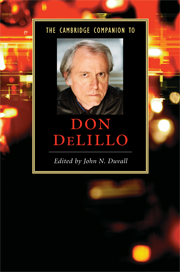Book contents
- Frontmatter
- Introduction: The power of history and the persistence of mystery
- PART I AESTHETIC AND CULTURAL INFLUENCES
- PART II EARLY FICTION
- PART III MAJOR NOVELS
- PART IV THEMES AND ISSUES
- 9 DeLillo and masculinity
- 10 DeLillo's Dedalian artists
- 11 DeLillo and the power of language
- 12 DeLillo and mystery
- Conclusion: Writing amid the ruins: 9/11 and Cosmopolis
- Select bibliography
- Guide to further reading
- Index
- Series List
9 - DeLillo and masculinity
from PART IV - THEMES AND ISSUES
Published online by Cambridge University Press: 28 June 2008
- Frontmatter
- Introduction: The power of history and the persistence of mystery
- PART I AESTHETIC AND CULTURAL INFLUENCES
- PART II EARLY FICTION
- PART III MAJOR NOVELS
- PART IV THEMES AND ISSUES
- 9 DeLillo and masculinity
- 10 DeLillo's Dedalian artists
- 11 DeLillo and the power of language
- 12 DeLillo and mystery
- Conclusion: Writing amid the ruins: 9/11 and Cosmopolis
- Select bibliography
- Guide to further reading
- Index
- Series List
Summary
Don DeLillo's fiction suggests that masculinity, rather than being inherent, is an insecure construction based on dominant societal norms and presented via mediated images. His writing offers a number of hypermasculine characters torn between upsetting and upholding the status quo; they display the inadequacy of stereotypes while suggesting that the concept of individuality is flawed and unsustainable. Literature can potentially aid the embedding of social conditioning; however, it can also provide a critical purchase from which to scrutinize social norms. While it is difficult to identify ideal alternatives in any cultural text, literature at least offers a forum for thinking about difference and boundary breaching. This is what DeLillo's writing does in its treatment of masculinity. Rather than replace one defunct cultural narrative with an equally invalid alternative, it displays the insecurity of masculinity without offering a facile replacement. What the reader instead becomes aware of is an emergent male self-consciousness, which is crucially and increasingly knowing about the performative nature of men's roles. For example, when Jack Gladney, the satirical protagonist of White Noise (1985), muses to himself about what his father-in-law might think of him, he reveals his own feelings of inadequacy, which may or may not reflect what Vernon thinks.
- Type
- Chapter
- Information
- The Cambridge Companion to Don DeLillo , pp. 125 - 136Publisher: Cambridge University PressPrint publication year: 2008
- 4
- Cited by



